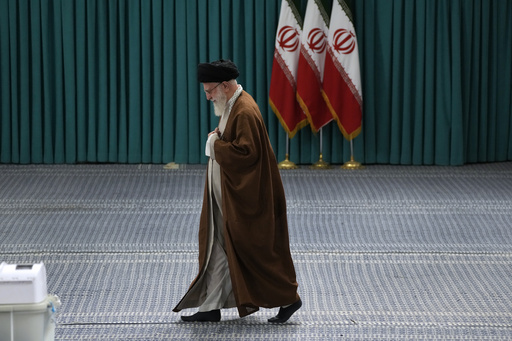TEHRAN, Iran — The Iranian government appears to be approving of some recent U.S. policy changes, even though they are initiated by President Donald Trump, whom Iranian operatives are allegedly plotting to eliminate.
Trump’s actions to halt foreign aid expenditures and possibly dissolve the U.S. Agency for International Development (USAID) have received positive coverage in Iranian state media.
Reports indicate that these decisions could sever financial support for various opponents of the Shiite regime, including pro-democracy activists who have benefited from U.S. initiatives aimed at fostering democracy around the world.
Simultaneously, Iranian officials seem to be signaling their expectation for communication from Trump regarding negotiations over Iran’s advancing nuclear agenda, which could have significant financial implications for the country. Harsh sanctions currently prevent Iran from accessing billions of dollars, and the future of its nuclear program, which is edging closer to weapons-grade uranium enrichment, is at stake.
Even as Trump issued an executive order on Tuesday aiming to reinforce “maximum pressure” on Iran, he alluded to a desire to engage in dialogue with Tehran.
Concerns are brewing among average Iranians regarding the implications of these developments. Following Trump’s announcement, Iran’s currency, the rial, plummeted to an unprecedented exchange rate of 850,000 to $1, reflecting the continuing economic instability that citizens are facing. Just ten years ago, the rial was valued at 32,000 to a dollar.
Maryam Faraji, a 27-year-old waitress from northern Tehran, highlighted that such U.S. policies may empower hardliners within Iran to intensify their repressive measures, as they might perceive less American support for citizens advocating for freedom.
State media have suggested that cuts to what they refer to as foreign-based opposition funding could reshape relations between Tehran and Washington.
The IRNA news agency claimed that reducing financial resources for those opposing the Iranian regime may considerably influence dynamics between the two nations.
Conservative newspapers, like Hamshahri, characterized Iran’s opposition as “counterrevolutionaries” who once reveled in Trump’s election, viewing it as a sign of the Islamic Republic’s imminent decline.
Moreover, the reformist publication Hammihan likened this situation to a shock for the external opponents of Iran’s government, and Iranian Foreign Ministry spokesman Esmail Bagahei clarified that U.S. funding previously provided to these activists was not charity, but rather compensation for services rendered.
Bagahei further criticized the Biden administration’s approach, characterizing it as an interventionist tactic to meddle in Iran’s internal matters through financial aid.
The fate of funding for Iranian activists amid USAID’s decision remains uncertain. Previously, substantial funding for civil society initiatives in Iran came from the U.S. State Department’s Near East Regional Democracy Fund (NERD), created in response to the Green Movement protests in 2009. In 2024, the Biden administration has requested $65 million for NERD, which has allocated over $600 million in its history for training journalists and activists, enhancing internet access during state-imposed shutdowns, and other supportive activities.
Despite inquiries regarding the future of NERD funding, the State Department has remained silent. Due to potential risks faced by activists from Iranian authorities, U.S. officials have historically kept the identities of NERD grant recipients confidential.
Iran’s government also noted that the U.S. refrained from directly criticizing the Islamic Republic during a recent session of the United Nations Human Rights Council. This abstention from criticism has generated speculation that Trump might be open to negotiations, a possibility he touted during his campaign.
Ayatollah Ali Khamenei, Iran’s Supreme Leader, has similarly suggested that discussions with the U.S. might be possible, stating that there is “no harm” in engaging with the “enemy.” However, he later cautioned against misplaced trust, likening diplomacy to potentially concealed threats.
While acknowledging that no explicit invitation for negotiations has been received, the Iranian government is making efforts to project a willingness to engage in dialogue. President Masoud Pezeshkian, who pushed for improved relations with the West, urged authorities to heed citizens’ concerns and refrain from further repression following the unrest surrounding Mahsa Amini’s death in 2022.
As Trump signed the executive order targeting Iran, he issued a stern warning that the country would face severe consequences if he were attacked. This order seeks to drastically reduce Iran’s oil exports and aims for a swift reactivation of United Nations sanctions related to its nuclear endeavors.
Nonetheless, Trump has also expressed a desire for diplomacy, stating: “I’m going to sign it, but hopefully, we’re not going to have to use it very much. We will see whether or not we can arrange or work out a deal with Iran.” He further emphasized that the goal is not to be hostile toward Iran but to prevent them from acquiring nuclear weapons.
In a follow-up post on social media, Trump claimed that reports of military action against Iran were overstated and indicated his preference for a peaceful agreement that would allow Iran to thrive.
While various factions within Iran’s government might oppose any potential discussions with the U.S., stemming from historical tensions and the fallout from the drone strike that killed General Qassem Soleimani in 2020, some moderates might utilize the current situation to argue for dialogue with the Trump administration.
However, amidst all political maneuvers, for many Iranians grappling with a struggling economy, the prospects of change or benefit appear uncertain. Taxi driver Gholanhossein Akbari, aged 27, expressed skepticism, asserting that ordinary citizens like him have never seen tangible benefits from U.S. support for Iranian pro-democracy activists abroad, stating, “We did not see any result from the funds the U.S. paid to foreign-based Iranian activists who only make comments in the media.”




